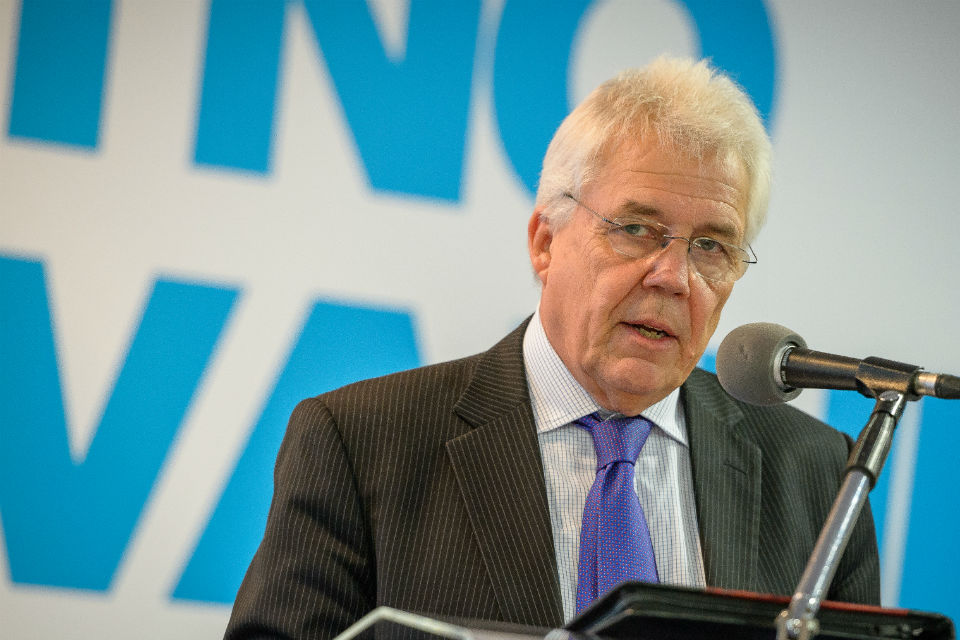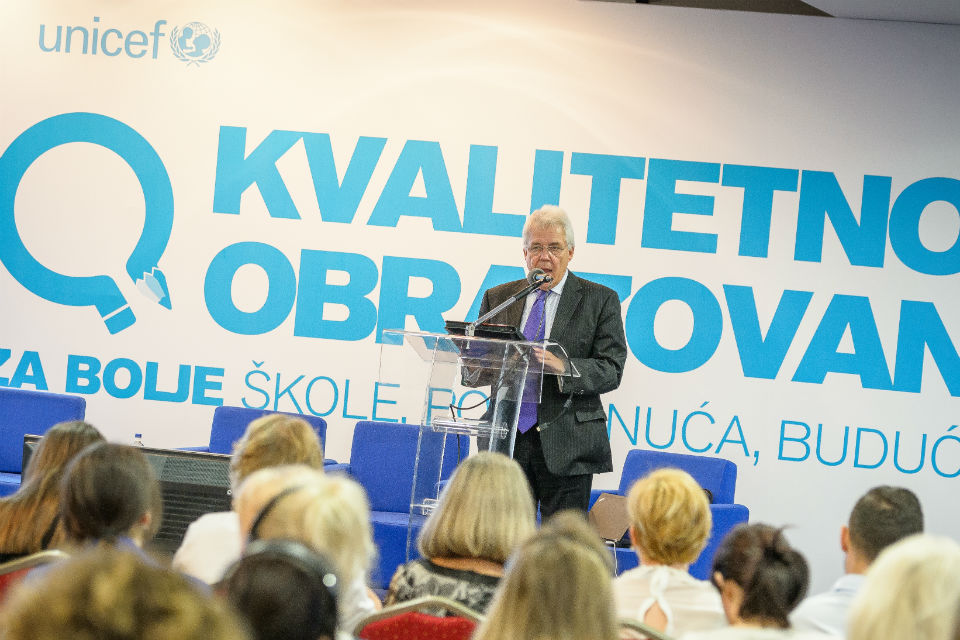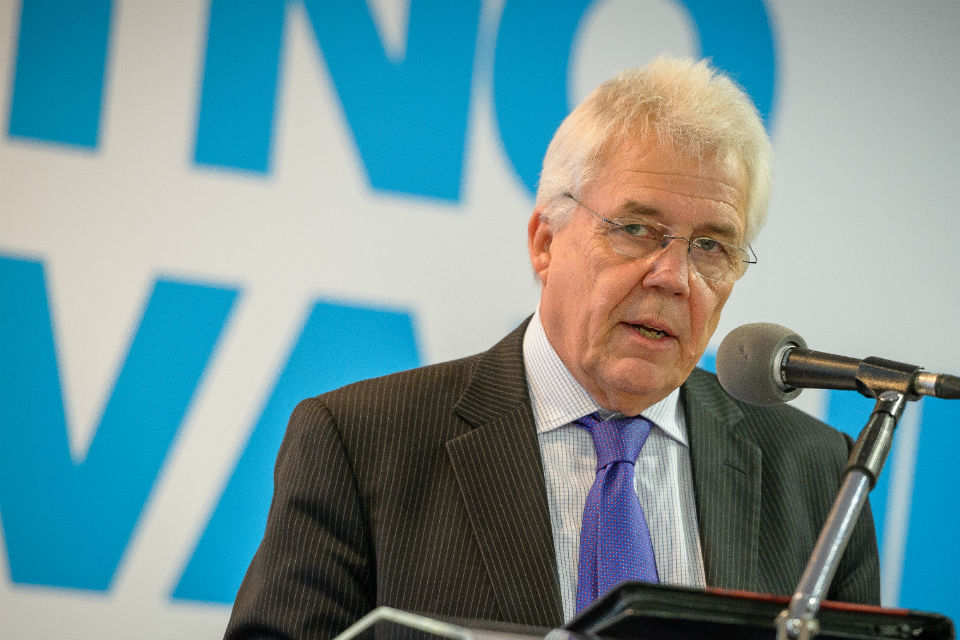"Better schools, better results, better future" conference in Montenegro
British ambassador to Montenegro Ian Whitting gave a speech at the UNICEF conference.

Dame i gospodo, dragi prijatelji,
Izuzetno mi je drago što imam ovu priliku da vam se obratim povodom te najvažnije teme - uloge koju obrazovanje igra u društvu i, što je možda još važnije, uloge koju igra u životima naše djece. Razvoj obrazovanja je uvijek neposredno pratio razvoj civilizacije. U moderno doba učenje je zauzimalo sve veći dio našeg života, prvo godine a onda decenije. Danas ono traje čitavog života i liči na veslanje uz rijeku - čim prestanemo struja nas vuče unazad. Bez njega ostajemo, kako reče vaš veliki pjesnik i vladika, s očima slijepi, koji vide a zaludu vide.
Iskoristiću ovaj trenutak da prestanem da vas mučim mojom posebnom verzijom vašeg jezika i pređem na engleski.

British ambassador to Montenegro Ian Whitting at the education conference; Photo: UNICEF / Dusko Miljanic
I am delighted to be speaking at this conference, and to be welcoming distinguished and inspirational experts from the United Kingdom to contribute to this most important topic of education.
Because education is the foundation of everything.
As Nelson Mandela put it, “Education is the most powerful weapon which you can use to change the world”. In the UK it is a defining element of government policy that every child deserves the best possible start in life and the support that enables them to fulfil their potential. Our “Early Years Foundation Stage” recognises that children develop very quickly at a young age, and that experiences from birth to the age of five have a major impact on their future life chances. So we support the work that UNICEF is pursuing with the Montenegrin government to expand coverage of early years education to nurture further the potential of the country’s finest and most promising, and also renewable, resource – its children.
Quality early education paves the way for a lifetime of learning – through primary, secondary, tertiary education – and beyond. We are all, and I include myself in this, we are all always learning. As technology advances, as the world changes and challenges increase – we build our capacity to respond, to innovate and to expand what is possible by constantly learning. The 19th century American philosopher John Dewey put it well, saying “Education is not preparation for life, it is life itself”.
I am especially pleased to be welcoming Professors Conrad Wolfram and James Arthur. It seems to me that their fields of expertise tap directly into the need to provide an educational atmosphere and experience that does not focus solely on rote learning facts and figures – but on learning how to learn. Their work focuses on developing learners who are confident in discovering new solutions, refining their skills so they can adapt to different situations, bringing individual innovation to the widest possible range of problems.

British ambassador to Montenegro Ian Whitting, OBE; Photo: UNICEF / Dusko Miljanic
For example, Professor Wolfram, harnessing technology not as a replacement for the human brain and effort, but as a way of enabling students to focus more on exciting mathematical concepts and applications, rather than tedious calculation.
And Professor James Arthur, whose work at the Jubilee Centre at the University of Birmingham has brought the essence of “character” to the heart of educational innovation in the UK. Putting pupils at the centre of the process, acknowledging that our behaviours and our values shape our potential and our reality. Recognising that education should always be rooted in character and virtue – and that developing this is not something that happens by chance, but is something that, with the right efforts, inputs, and understanding, we can cultivate in our schools and in our communities. I feel these themes of “innovation” and “character” in education have a special relevance for Montenegro at this time. Montenegro has placed itself firmly on the path of European integration. And this involves change – changes in institutions, changes in standards, changes in practices, and changes in attitudes. The EU is a union of shared values that underpins and enables mutually beneficial cooperation across a huge number of areas, including trade, energy security and justice, to name just a few. Systems and institutions across member states vary enormously, but the values that underpin them are the same. Montenegro will find its own way to implement these European standards and values. Innovation in thought, in creativity, and in flexibility to harness resources to develop best-fit, purpose-driven solutions will play an important part in this. As will strength of character, and the confidence that goes with values-based behaviour to take bold steps forward, to have the self-assurance to lead Montenegro into an exciting, challenging, and rewarding process of internationalisation, delivering security and prosperity for its people in the region. The UK is and will remain a strong supporter of Montenegro’s integration into this process where currently the EU and also NATO membership are key goals. And our educational support has a vital role to play. We are proud of our British Council presence, celebrating 20 years in Montenegro this year – using its experience and its global network of expertise to support teacher development, innovation in methodology and assessment, English language learning resources and certifications that facilitate international exchanges, as well as supporting professional skills development programmes in public administration.
Our Embassy also manages the “Chevening scholarship” the British Government’s leadership global scholarship programme - through which we send around two Montenegrin citizens a year on Masters Courses in the UK, home to some of the finest Universities in the world. For those interested, the next application window will open in early autumn. Candidates are selected for their ability, their potential and their vision - and then given the opportunity to deepen their knowledge through Masters’ studies, empowering them to take leadership roles back here in Montenegro. Though this is a small programme, we believe in its transformative potential. International experiences help to widen people’s scope of possibilities – as we are doing here at this conference: sharing different perspectives and insights opens all of our minds to alternative ideas, new horizons, expanding our vision of what we can achieve. As Montenegro progresses further in EU integration, these exchange opportunities become even more numerous and fruitful – especially if we can, through events such as this, provide a strong foundation for Montenegro’s young people and students to make the most of these opportunities.
In closing, I would like to reiterate our support for this excellent conference, where exchanges have already inspired participants, and highlighted new avenues for us to explore. And to welcome again our visitors from the UK – we have plenty to share with each other, to learn from each other, and to develop together.